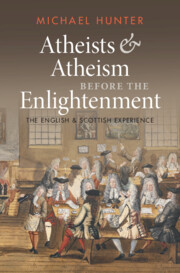Book contents
- Atheists and Atheism before the Enlightenment
- Atheists and Atheism before the Enlightenment
- Copyright page
- Contents
- Acknowledgements
- Chapter 1 Introduction
- Chapter 2 The Problem of ‘Atheism’ in Early Modern England
- Chapter 3 Atheism among the Godly
- Chapter 4 ‘This degenerate Age … so miserably over-run with Scepticism and Infidelity’
- Chapter 5 ‘Aikenhead the Atheist’
- Chapter 6 An Atheist Text by Archibald Pitcairne
- Chapter 7 The Text of Pitcairneana
- Chapter 8 The Trial of Tinkler Ducket
- Chapter 9 Conclusion
- Bibliography
- Index
Chapter 8 - The Trial of Tinkler Ducket
Atheism and Libertinism in Eighteenth-Century England*
Published online by Cambridge University Press: 06 July 2023
- Atheists and Atheism before the Enlightenment
- Atheists and Atheism before the Enlightenment
- Copyright page
- Contents
- Acknowledgements
- Chapter 1 Introduction
- Chapter 2 The Problem of ‘Atheism’ in Early Modern England
- Chapter 3 Atheism among the Godly
- Chapter 4 ‘This degenerate Age … so miserably over-run with Scepticism and Infidelity’
- Chapter 5 ‘Aikenhead the Atheist’
- Chapter 6 An Atheist Text by Archibald Pitcairne
- Chapter 7 The Text of Pitcairneana
- Chapter 8 The Trial of Tinkler Ducket
- Chapter 9 Conclusion
- Bibliography
- Index
Summary
Chapter 8 is about the trial of Tinkler Ducket, a Fellow of Gonville and Caius College, Cambridge, who in 1739 was arraigned before the Vice-Chancellor’s court in Cambridge accused of atheism on the basis of a letter he had written four years earlier, in which he gloried at having reached ‘the Top, the ne plus ultra of atheism’. The case was dominated by the testimony of Mary Richards, who accused Ducket of attempting to seduce her, and less attention was paid to a remarkable defence speech that Ducket made, in which he argued for the right to freedom of thought and private judgement and claimed that an atheist might be a perfectly moral being. Various witnesses were called, most of whom attested to Ducket’s good character, but the court declared him guilty, and he was expelled from the university. It is argued that the case illustrates a degree of complacency, combined with sensationalism, on the part of the authorities, which made its outcome a foregone conclusion. An appendix lists the various accounts of Ducket’s trial.
Keywords
- Type
- Chapter
- Information
- Atheists and Atheism before the EnlightenmentThe English and Scottish Experience, pp. 158 - 177Publisher: Cambridge University PressPrint publication year: 2023

